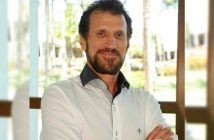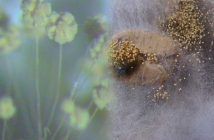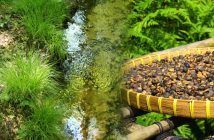The valuation of the specialty coffees produced in the place feeds the dream of the producers in obtaining the of Origin Denomination Certificate
The Daniella farm www.sitiodaniella.com.br is as well-known in the world of specialty coffees as the owner who gave its name to the place, Daniella Pelosini, thanks to its protagonist as producer, in a predominantly male universe, whose archaic heritages still prevail.
Daniella is a female farmer, who is not afraid of getting her hands dirty concerning all that she commits herself to do. And with the farm it is no different. When our staff arrived, we had the opportunity to observe the property for some time, before she joined us. And it was easy to identify, in every part of the site, the strength of the female hand in conducting business. Everything has been meticulously arranged, painted, clean, giving us the impression that it is easy to run a specialty coffee farm. It is not, but for her, it is simply natural.
The property was bought by her father, Laerte Pelosini Filho, in 1977, when he separated from his ex-wife, Dani’s mother. As he wanted to be sure that he would continue to live with his daughter and, knowing about her passion for animals, especially for dogs and horses (she practiced horsemanship for many years), he thought the farm would be a way to always keep her around. And it worked!
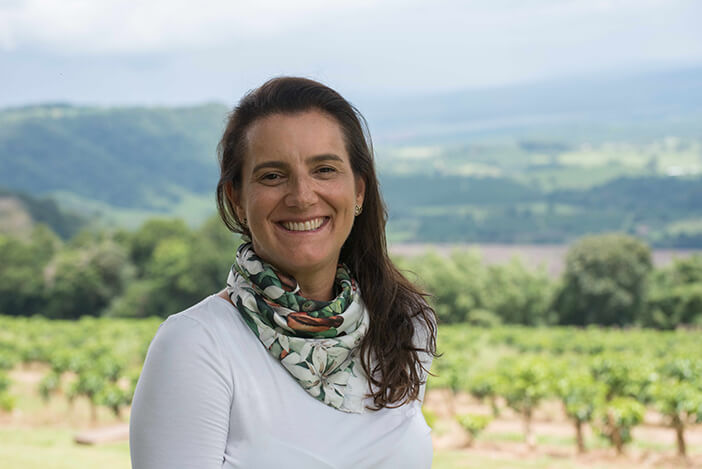
Daniella Pelosini
“When my family bought the land, there was nothing here. It was my father and grandfather who made absolutely everything, bit by bit. There was some corn, cattle and coffee, which was practically decimated in the great frost of 1976,” she says.
They dedicated themselves for many years to the production of dairy cattle while Dani was divided between the economics course at FAAP (Faculdade Armando Álvares Penteado) and the establishment, her attribute, from 18 to 26 years of age.
When they gave up producing B milk, they began to invest more heavily in the coffees, and Dani moved from São Bernardo, where she lived with her mother, to stay in the farm.
“There was a cooperative in San Manuel, which started to promote some regional coffee contests and we participated. We started scoring and from there, we decided to actually invest in the wet path, buying a coffee washer and dryer. And we never stopped growing,” the producer recalls.
She also remembers that they had already participated in some state contests and, in one of them, they were in second place, reaching a very good grade. In an event, she was introduced to Mr. Aldir Alves Teixeira, a living legend of illy read the full story about him at, who encouraged her to send samples of her coffees to the company’s contest.
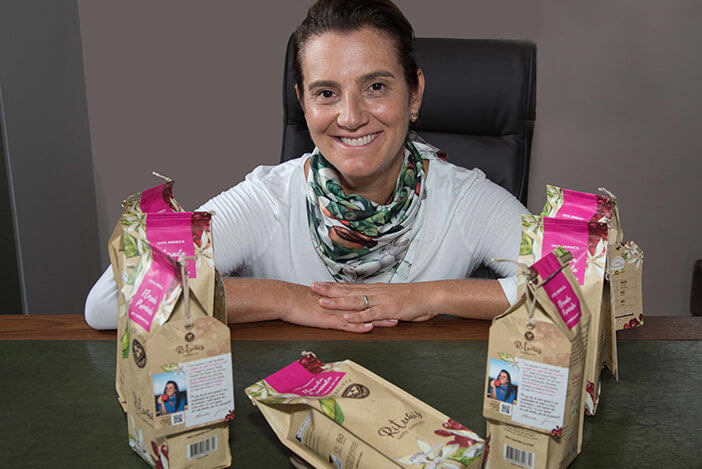
Microfone 3 Corações Florada Premiada
In the first year, her coffees were not approved because of its excessive moisture. Illy www.illy.com has a very rigid standard regarding the coffees it buys around the world. Nevertheless, in a second attempt, they were approved and became suppliers of the company. Shortly thereafter, Dani received a call from the company stating that she had been selected among illy’s 40 best coffees. “The list was surreal, there were 38 Minas Gerais producers, us and Fávero, a producer from Piraju, who had been chosen in the previous year as illy’s Brazilian champion”, she excitedly says.
For three years, they have participated in the competition and have kept on the list of the 40 best, showing a constancy in quality.
With 79 hectares and around 200,000 feet of coffees, the Daniella farm is at a maximum height of 1007 meters and a minimum one of 930 meters. About 60% of all its production is of specialty coffees, coming from her Red Catuaí IAC 144, Yellow Catuaí IAC 162, partly from her Tupi IAC 1669-33, and right now, still under testing, the Aranãs. “We made a pole of Aranãs and had a small production of a wonderful coffee. Half of it came in an orange color and in huge grains. The Q-Graders who have tasted them perceived a lemon balm tone, and I am very hopeful with this variety. I’m very eager to make a field out of Aranãs, because the truth is that it has to be fond of the place and it seems that Aranãs like Pardinho,” she explains.
As a vegetarian, Daniella says she cares a lot about the more natural production of her coffees. “All our poles end or start on one side of the forest, and we are concerned to restore the native forest to a 12-hectare area that will comprise the remaining Atlantic Rainforest capes found in 1977. Our proposal is to create continuous forest corridors to help in the preservation of the native fauna and flora,” she says proudly.
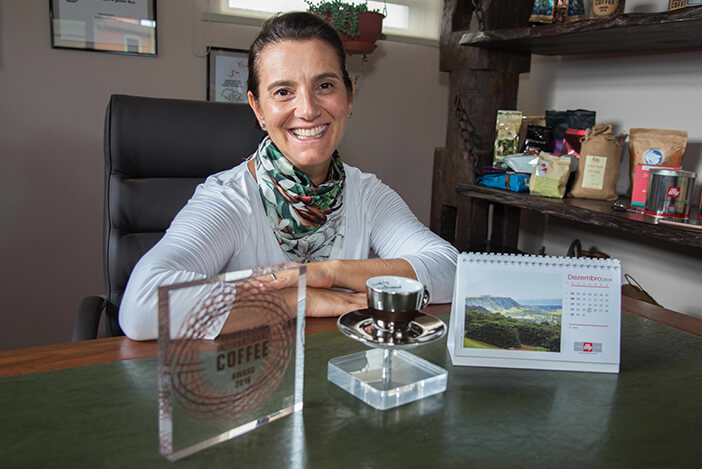
Sítio Daniella mantém longa parceria com a illy
“I’ve been a vegetarian for over 20 years. I take all possible care with what I put into my body. And it could not be different with the coffees I produce, since I also drink them. At this point, I’m experimenting with organic coffees on a pole next to a washing machine. This is an IAC 144, which is growing only with organomineral fertilizer, a technology that contributes to low carbon agriculture, for reducing the emission of greenhouse gases resulting from the superficial application of organic waste, according to Embrapa,” she says.
The experiment began in September last year on a two-hectare pole. “Preliminary studies indicate that the use of organomineral fertilizer may increase the note in coffee at some points. This is ideal for those who produce specialty coffees”, she exemplifies.
Dani makes a point in making clear that her specialty coffees production does not have a plastered plan. “Every coffee needs something. I have to look at every coffee plant and understand what it needs at that moment. Often, the leaves are beautiful, green, and they do not need anything, but attention and affection. And those who work with agricultural production have to be humble to understand that we have no control over everything. It is a constant learning. We have to look at the coffee, respect and only then, if necessary, act to correct something,” she emphasizes.
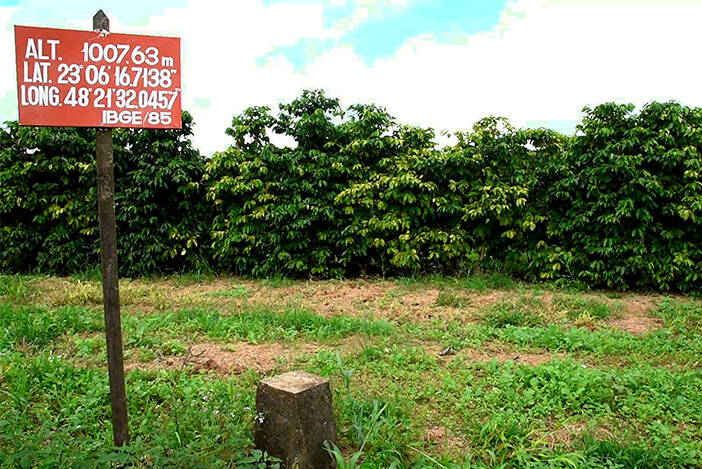
A propriedade está há 1007 metros
The Daniella farm has only four fixed employees and selectively selects a mechanized harvest. At the time of harvest, she hires an average number of 40 people, all from Minas. “Around here, there is no longer this type of labor available. So, we bring the people in and establish them in the right places,” she says. Because of all the care, they have managed to solve the problem of late harvest, a characteristic of the region. “Around the 10th of July, we are beginning to harvest. In the past, it would only start in August, when coffee had already been collected in Minas Gerais,” she explains.
Many people, mainly abroad, twist their nose when it comes to mechanical harvesting of specialty coffees. But the reality is that, without mechanization in Brazil, there is no way to survive, especially in a region so close to the largest metropolis in South America, where employment opportunities are much more attractive to workers.

Todos os talhões terminam num pequeno pedaço de Mata
And to mechanize, Daniella had to change the spacing between the coffee grounds, which are now 3.5 meters by 60 centimeters away from each ground. “I made a fool of myself in the renovation part of the crop. I could have already done it. I was on the schedule, but then production was in full swing and I kept postponing it. But not this time round. We have a 10-hectare pole sketched, a pole with recepa and two poles of a year and a half. The result is that in 2019 we will have a very small production. But next year will be fantastic,” she says.
Awarded Blooming Project
Last year, 3Corações promoted, in partnership with BSCA, the Brazilian Specialty Coffee Association, the first edition of the Awarded Blooming (“Florada Premiada”) Contest, with the objective of valuing the work of the Brazilian coffee growers. In addition to creating a platform for disseminating best practices, the company is launching microlots named “Awarded Blooming Rituals”, from producers that won the contest. Among them is Daniella’s coffee, classified as champion in the region of Ourinhos & Avaré, via humid, relative to the 2018/19 harvest. According to 3Corações, 100% of the profit on the sale of microlots will be reverted to producers (visit www.projetofloradapremiada.com.br)

Foi adquirida em 1977
Pardinho as the Origin Denomination
The Federal Institute of Education, Science and Technology of São Paulo, IFSP, Campus Avaré, www.ifsp.edu.br is leading an association project of collective brands of diverse products and services, in the region of Cuesta de Botucatu, that comprises several neighboring municipalities.
The collective brand is a visually perceptible sign, such as a seal, for example, that aims to differentiate products or services from members of a particular collective entity such as association, cooperative, union etc.
Among these collective brands will be the specialty coffee produced in the region of Pardinho. “It is the first step to claim an origin denomination in the near future,” explains Daniella.
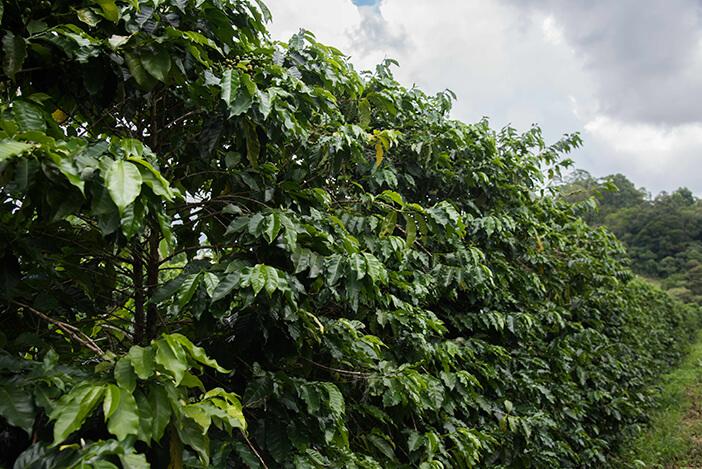
São 200 mil pés de café, em 50 hectares
Specialty coffee fair trade
The Daniella farm has joined the Specialty Coffees Silver Cooperative (“Cooperativa Prata de Cafés Especiais”), from São Manuel, comprised of family producers, and is committed to promoting the quality of the specialty coffees in midwest São Paulo. “We wish to recover the lost prestige of the region, which lost space for Minas, for a series of factors, not only quality,” she says.
The idea is to spread the word about the small farmers in the region through the Cooperative, helping them produce a special high quality FairTrade coffee. www.fairtradecertified.org

“Preciso olhar para cada pé de café e saber o que cada um está precisando”
“We will build a test and rating room here at the farm, so that small producers can be sure of the quality of their coffees and sell them for a fair price. The FairTrade coffee is not necessarily a high quality product. We long to change that reality. We have partnered with a company in Japan so that producers’ coffee can make their way without a lot of middlemen, in a highly demanding consumer market”, she concludes.
Fotos e Vídeo: Clodoir de Oliveira

